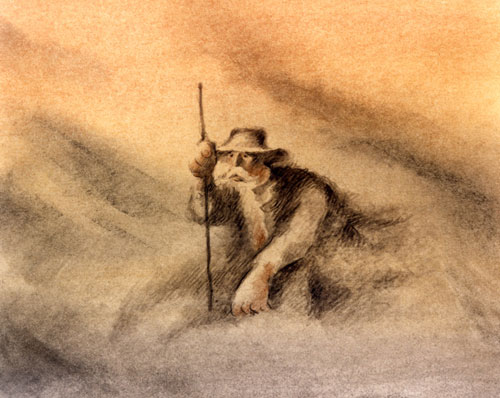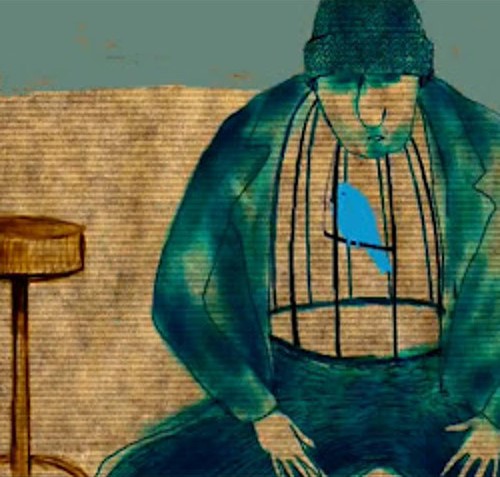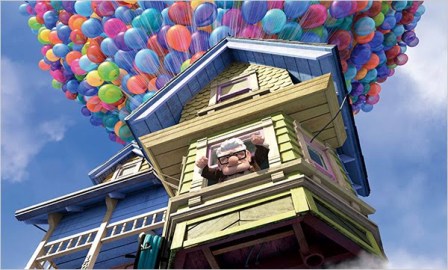
The Man Who Planted Trees
The Man Who Planted Trees (L’homme qui plantait des arbres), also known as The Story of Elzéard Bouffier, is an allegorical tale by French author Jean Giono, published in 1953. In 1987, the book produced as a short animated film directed by Frédéric Back.
The film won the Academy Award (1988) for Best Animated Short Film. It also competed for the Short Film Palme d’Or at the 1987 Cannes Film Festival. In 1994, it was voted number 44 of the 50 Greatest Cartoons of all time by members of the animation field. The book tells the story of a solitary sheperd who patiently plants and nurtures a forest of thousands of trees, single-handedly transforming his arid surroundings into a thriving oasis. Undeterred by two World Wars, and without any thought of personal reward, the sheperd tirelessly sows his seeds and acorns with the greatest care. As if by magic, a landscape that seemed condemned grows green again. A film of great beauty and hope, this story is a remarkable parable for all ages and an inspiring testament to the power of one person.
Forty years ago I took a long walk. I wandered on mountain roads unknown to tourists, in the region where the Alps reach Provence. The south and southeast of the land is surrounded by the tributaries of the Durance river – Sisteron and Mirebeau. To the north is the branch of the Drome river from its source to Die, and to the west is the Comtat Venaissin plateau and the hills of Ventoux Mountain. My tour area included the entire northern Basses Alps south of Drome and a small part of Vaucluse.
This derelict area, where I went for a walk, consisted of barren lands as far as the eye could see. Only wild lavender was grown in these lands at an altitude of 1200-1300 meters above sea level.
I decided to cross the region at its widest point. After three days of walking, I found myself in a deserted place. I camped next to the skeleton of an abandoned town. I was thirsty since the previous day and needed to drink water immediately. The houses, planted deep like beehives, were already in ruins, but I still thought that there must have been a spring or well somewhere nearby at one time or another. There was indeed a spring. but it was already dry. Five or six roofed houses and a ruined church, devoured by wind and rain, were arranged like houses and churches in living towns. But life had abandoned them.
It was a beautiful sunny June day, but the wind blew relentlessly on these bare hills open to the sky. The sound of the wind howling over the ruins of the houses was reminiscent of a wild animal being disturbed while eating its prey.
I should have kept walking. But after walking for five hours, I still couldn’t find any water; There was no sign that I would find it. Everywhere there was the same dry land, the same dry grass. In the distance I seemed to see an upright black shape. I thought it was the trunk of a lonely tree. However, I took my chance and started walking towards him. He was a shepherd. He surrounded him about thirty sheep spread over the sun-scorched lands. He gave me water from his canteen. A short time later he led me to his tent, hidden in a recess. The taste of the water was great. It got its water from a deep natural well, a primitive spinning wheel was built over the well. .
He spoke very little. Most people who live alone speak little. But for someone living in such an insignificant place, he was a surprisingly confident and controlled man. He lived not in a hut, but in a real house made of stone.
It was evident how meticulously he had repaired the house and created it from a ruin. It had a solid roof and prevented rain from entering the house. The sound of the wind on the roof was reminiscent of the sound of the sea hitting the beach.
The interior of the house was tidy and clean, the dishes washed, the floor swept, the gun cleaned and oiled. Soup was cooking on the fire. I noticed that he was clean-shaven, all his buttons were tightly sewn, and his clothes had been meticulously repaired to make the patches almost invisible.
He offered to share his soup, and then when I handed him my tobacco bag, he said he didn’t smoke. His dog, who was as quiet as he was, was friendly without being flattered.
It was clear from the beginning that I would spend the night there. The nearest town was a day and a half away, and I also knew what the towns were like here. You wouldn’t come across different towns in this part of the world. Where the driveways ended, there were four or five towns buried among the oak trees.
Charcoal producers lived in the towns. Life in these towns is difficult. In a harsh climate, summer and winter, conflicting selves boil over in families that live in a rush. The desire to escape is so desperate and so strong that ambitions reach wild proportions.
Men drive their cars loaded with charcoal from the villages to the town. Even the strongest character crumbles under constant pressure.
Women stay at home and raise their grudges. Everything is a matter of disagreement and competition. Everything from selling charcoal to sitting in church, from competing vices to any mix of virtue and vice, is a cause for quarrel. On top of all this, the incessant wind is annoying. Epidemics of suicide and fits of madness, often resulting in murder, are common here.
The non-smoking shepherd went and took a small bag. He emptied the acorns out of the bag onto the table. He began to examine them one by one and choose the good acorns. I smoked my pipe and offered to help. He said it was his job. How much . When I saw that he was working carefully, I did not insist. That’s what our whole conversation was about. After selecting enough good acorns, he began to divide the acorns into groups of ten.
He carefully inspected the acorns and began to discard any small or slightly cracked acorns. After choosing a hundred perfect acorns, he quit his job and went to bed.
Being with him gave me peace of mind. The next morning I asked him if I could stay at his house all day and rest. This took my request very naturally, or gave me the feeling that nothing could disturb him. I didn’t need to rest, but I was intrigued and wanted to know more about him. He took his flock out of the barn and took the bag in which he had carefully selected and counted the acorns, put it in a bucket of water, and took it out.
I noticed that he was carrying a thumb-thick, one-and-a-half meter long steel rod as his staff. I followed a path parallel to the shepherd’s and started walking like a person who enjoys it. He took his sheep near the cave and left them to graze under the guard of his dog.
Then it came to where I was standing. He was going my way, and he invited me to go with him if I had nothing better to do.
When he reached the place he wanted to go, he started digging holes with his stick, placing an acorn in the holes and closing the holes. He was planting acorns. I asked him if he owned the land. He said not. Did he know who its owner was? No, he didn’t know.
He thought it was common land or land of unrelated people. Who are their owners? It didn’t interest him at all. With great care he planted a hundred acorns.
After lunch, he started picking bonito again. Since he answered all my questions, I must have been asking questions persistently. He had been planting trees here for three years.
He had planted exactly one hundred thousand acorns. Twenty thousand of them gave seedlings. He estimated that half of the twenty thousand saplings would be lost to rodents and God’s unknown plans. Even that meant that ten thousand oak trees would grow where there was nothing before.
At that moment, I wondered how old he was. It was obvious that he was over fifty. He said fifty-five. His name was “Elzeard Bouffier”. He once had a farm on the plain, where he spent his whole life.
But he lost his only child, his son, and then his wife. Later, he came here to be alone, to live away from the hustle and bustle with his sheep and dog. Realizing that this part of the country was dying of treelessness, he had nothing else to do and decided to put things right.
Because I lead a lonely life, I knew how to relate to people like me and to be careful about sensitive issues. But I made one mistake with it. Since I was very young, I naturally thought of the future in relation to myself and assumed that everyone was after the same happiness. I commented on how magnificent ten thousand oak trees would look in thirty years. He gave me a simple answer; He said that if God gave him that long life, he would plant a lot of trees in these thirty years and that ten thousand trees would be just a drop in the ocean.
He had begun to study the breeding methods of beech trees and had set up a small nursery near his home. He had fenced off the saplings to protect them from his sheep, and already the saplings were among the best of their kind. In low areas where he thought there was sufficient moisture, he considered planting birch trees.
We left the next morning.
The next year, the War of 1914 began. I was in the army for five years. As an infantryman, I didn’t have much time to think about trees. To tell the truth, I wasn’t too impressed with what I saw.
Oaks are like collecting stamps. I saw it as a hobby. I forgot after a while.
When World War I was over, I had some money in my pocket when I was discharged and a deep desire for fresh air. With no other purpose other than to get some fresh air, I set off on a hike back into that barren land.
The region had not changed much. But after I passed the dead town, I saw a gray mist covering the hills in the distance like a carpet.
I had seen so many people die in the last five years that I could easily imagine Elzeard Bouffier dying too. To twenty-year-olds, fifty-year-olds look like they’re on the ground. But he was not dead. On the contrary, he looked very vigorous and healthy. He had a completely different profession. He had only four sheep left, but he had close to a hundred hives. Since they posed a threat to their trees, he scattered his sheep and started beekeeping. As he said and I observed, the war did not make any difference in his life, and he continued to plant trees as before.
The oaks of 1910 were ten years old, taller than ours. An impressive image. they were forming.
It was as if I was speechless, and he was speechless. We spent a whole day walking quietly through the forest. The forest consisted of three parts. It was 11 km long at its widest point. Remembering that all this came from the hands and soul of a single person without tools, you saw that man can be as effective as God in other areas besides destruction.
When I saw the beech trees reaching up to my shoulders and stretching as far as the eye could see, I understood that he had implemented his plans. The oaks formed a thick, dense forest, and they were long past the age at the mercy of rodents. As for God and his power to destroy, now a whirlwind was needed to destroy the forest the shepherd had created. He showed me the birch forests planted in 1915, when I fought in Verdun. He had planted the birch saplings in low areas where he thought there was enough moisture below the soil surface. They were fresh and delicate like teenagers and full of lust for life.
This artifact seemed to create a kind of chain reaction; but Elzeard Bouffier was not thinking about it.
As always, he stubbornly continued to carry out his simple and natural task. But as I was driving through town, I saw the creeks, which had been dry for a long time, filling up with water again. In fact, it was the most impressive chain reaction I’ve ever seen. The last time these streams flowed was in antiquity.
Some of the desolate towns I mentioned at the beginning of my story were built on the site of old Welsh-Roman towns, and traces of ancient settlements can still be found. In the twentieth century, archaeologists found fishing rods in these towns where cisterns were the only source of water.
The wind also carried the seeds. With the return of the water, the willows, the water reeds, the meadows, the gardens, the flowers, and the reasons for living were also back.
But the change happened so slowly that people got used to the change and started to accept it as natural. After the rabbits and wild boars. Hunters who went to the desolate areas saw the young saplings, but considered them as one of nature’s lovely whims. Therefore, no one interfered with what the shepherd was doing. If they realized what he was doing, they would try to stop him. But no one suspected. Who could imagine such determination and magnificent generosity in towns or government offices?
I visited Elzeard Bouffier annually in 1920 and beyond. I never saw him in doubt or weak. God knows how many reasons he has given to worry! I didn’t keep track of the disappointments and obstacles he faced. Trouble was inevitable for such a great success, this kind of passion could not be won without struggles against despair. Over ten thousand a year. spent planting oaks.
All the oaks are dead. The next year he gave up oaks and turned to beeches. Beechs caused a great silence dream even more than oaks.
What an exceptional personality he was can be appreciated much better when it is remembered that he accomplished all that he had accomplished in complete solitude.
In the last years of his life, he was so distant from people that he lost the habit of speaking. Or he didn’t feel the need to speak.
In 1933, a forest protection officer, surprised by what he saw, visited him and said that he should not start a fire outside so as not to endanger the “natural” forest.
This simple shepherd replied that it was the first time he had seen a forest growing by itself. During this period, he was planting beech trees in a region twelve kilometers from where he lived. Now that he was seventy-five years old, he had decided to build himself a stone cottage among the young trees to avoid returning home every night. He built the cottage the following year.
In 1935, an official delegation came to study the “natural forest”.
Among the visitors were a senior official from the Forestry Commission, a deputy and many technical staff. There was a lot of empty talk. It was decided that something should be done, but nothing was done except for one beneficial measure from Allah. Forests were placed under state protection and the manufacture of charcoal was banned. It was impossible not to be impressed by the beauty of these healthy and young trees. Even the deputy was fascinated. .
We found him working like a madman twenty kilometers from where the delegation was inspecting. The forest guard was not my friend for nothing, he knew the place and the meaning of everything and spoke in vain. I gave him some eggs I had brought as a gift, and then we split our ration into three. We watched the surroundings in silence while we ate and for a while after we ate. The direction we came from was covered with six or seven meter trees. I remembered what the land had looked like in 1913: an empty and wild piece of nature.
Peaceful and orderly work, a frugal lifestyle, breathing the air of the mountains, and above all peace of mind, had made the old man extraordinarily healthy. He was one of God’s athletes. How many more acres of land with trees? I thought it would cover. Before leaving, my friend spoke simply and briefly about some tree species that might be suitable for this area, but he did not insist. “He knows a lot more about this than I do,” he said. After walking for about an hour, he said, “Actually, he is the wisest man in the world. “He’s found a great recipe for happiness,” she said.
Thanks to my friend, not only the forest, but also the happiness of our hero was protected. Three forest guards were assigned to the forest area and were so intimidated that they were indifferent to any bribes the lumber merchants might offer them.
The tree-planter’s work was not in real danger until the 1939 war. Automobiles these days were powered by machines that turned wood into gas, and there was never enough wood to be found. People had begun to cut down the oaks planted in 1910, but the trees were so far from the main roads that the project was abandoned, as they did not even pay for the running costs. The shepherd did not even know what had happened. Thirty kilometers away he was doing his job, ignoring the 1939 war just as he was ignoring the 1914 war.
One of the senior forest engineers in the delegation was my friend. I explained the secret of the natural forest to him, and the following week we went with him to visit Elzeard Bouffier.
I last saw Elzeard Bouffier in June 1945. He was eighty-seven years old. I proceeded to the region on the road I knew, although everything was neglected due to the war, bus services had started between the Durance valley and the mountains. I thought I didn’t recognize the places I was walking through, as I was crossing the terrain pretty fast. I thought some of the villages we passed were new settlements. Hearing the names of the villages, I could tell that I was coming back to towns that were once in ruins and abandoned. I got off the bus at Vergons.
In 1913, only three people lived in this village of eleven households. These were three people who hated each other, were rude and aloof. They made their living by setting traps and lived in almost prehistoric conditions in terms of material and morality.
Nettles covered the empty houses around them. They lived a hopeless life, they had no hope other than death. It cannot be said that this situation leads to a virtuous life.
But everything had changed, even the weather. The dry and harsh breezes I had seen before had been replaced by a light and fragrant breeze. There was a sound like the sound of water in the heights, it was the sound of the wind in the forest. Most surprising was the sound of water flowing into a pond. I saw the townspeople build a fountain: water was gushing from the fountain, and the thing that touched me the most was the fact that a lemon tree, about four years old, had been planted at the head of the fountain.
It was already a solid tree, and an indisputable symbol of a return to life.
Vergons bore signs of other business that could only be undertaken with hope. Hope was back.
Ruins were tidied up, crumbling walls demolished, five old houses rebuilt. had been Twenty-eight people lived in the village, eight of whom were newly married couples. The newly painted houses were surrounded by small gardens of vegetables and flowers, where cabbages mingled with rose bushes, leeks with snapdragons, celery with forget-me-nots. The village had become a place where people wanted to live.
I continued walking. The war had just ended, living conditions were still limited, but Lazarus had risen from his grave. I could see small fields of barley and rye on the lower slopes of the mountain, and the green cover of grassland in the deep valleys.
In the intervening eight years, the entire region had regained its health and prosperity. Where I saw only ruins in 1913 were clean, plastered farm buildings. Farms were showing signs of a happy and comfortable life. The old springs, fed by the rain and snow water brought by the forest, began to flow loudly again, and the waters from the springs were carefully diverted to the irrigation canals. In the farms located in the middle of the oak groves, the waters of the fountain overflowed and flowed onto the ground covered by the mint like a rug. Towns were gradually rebuilt. People from the plains, where the land is expensive, came and settled here, bringing with them the spirit of youth, movement and adventure. On the paths and roads you met well-fed men and women, boys and girls who knew how to laugh; old country entertainments and sports had been rediscovered.
More than ten thousand people owed their happiness to Elzeard Bouffier, if we count the old population of the region, which has become unrecognizable since their lives have become easier, and the newcomers.
Considering that a single man, with nothing but his physical and spiritual resources, has turned this desert into a paradise, I feel it is admirable to be human after all. Considering the consistency, greatness of spirit, perseverance and generosity required to achieve these results, I have great respect for that old, uneducated villager who successfully completed a work worthy of God without any help.
Elzeard Bouffier died peacefully in an old people’s home in Banon in 1947.



